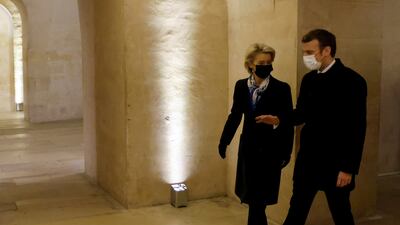France has taken over the rotating presidency of the European Union with a desire to gain greater autonomy for the 27-nation bloc.
Days after his intemperate language about unvaccinated people caused outrage in France, President Emmanuel Macron will need to employ a more unifying strategy to heal divisions in the bloc over the next six months.
Since being elected five years ago, Mr Macron has called for greater sovereignty for the EU and will be keen to put his plan into practice.
He and his team want to promote the introduction of an EU minimum wage, a carbon tax on imported products, and reform of the bloc’s fiscal rules. France also wants to speed up discussions between member states to find a consensus on the stalled overhaul of the EU’s asylum system.
Detailing the goals of the French presidency, a senior French government official said the EU needs to be more sovereign to be in a position to make its own choices while defending its ideals of democracy.
“There is a risk for Europeans to simply go out of history,” the official said. “In the sense that we would no longer contribute to writing the history of the world, and others would come and write our own history. There is an existential danger.”

On Friday Mr Macron met European Commission President Ursula von der Leyen at the Pantheon in Paris to pay tribute to two European figures. The pair honoured the memories of Simone Veil and Jean Monnet.
Ms Veil was an Auschwitz survivor who served as a magistrate judge and health minister in France, while Mr Monnet was a founding father of the EU.
Both Mr Macron and Ms von der Leyen wore masks during the visit inside the domed building, amid a recent surge in Covid cases in France.
Earlier this week Mr Macron vowed to “hassle” unvaccinated people in France by making life harder for them.
His controversial language dominated news broadcasts and provoked angry reactions from his political rivals.
France and Germany at odds on nuclear energy
On Friday Germany and France were said to have “agreed to disagree” over the EU's move to label nuclear energy as green.
German Europe Minister Anna Luehrmann denied there was conflict between the two on the contentious issue.
The European Commission has issued a draft proposal to label nuclear energy as a “green” energy source, making it eligible for investment under rules for promoting a carbon-neutral future.
France has led the charge for nuclear power — its main energy source which accounts for 70 per cent of its overall supply — to be included on the list.
Germany on the other hand is in the process of shutting all its nuclear plants and remains opposed to the move.
“We know what the French position is on nuclear power and the French side knows very well what the German position is,” Ms Luehrmann told AFP.
“So we can say we agree to disagree on the issue and then turn to the issues where we want to move forward … from climate protection to sustainable investments, to the issue of European strategic sovereignty.”
The green energy list, known as the EU's “taxonomy”, was meant to have landed before the end of 2021 but deep divisions between member states have stalled the process.
On New Year’s Eve the Commission sent out a draft text of its plans and said it had started consulting with members on the proposals.
If a majority of member states back it, it will become EU law, coming into effect from 2023.
“We have made it very clear as the entire federal government that we are against the inclusion of nuclear as a sustainable financial product,” Ms Luehrmann said.
“We have to go in a different direction for climate reasons, but also for reasons of political independence, and I see that as an argument against both gas and nuclear energy,” she said.
However, she conceded that “we also know that we are not the majority in Europe” on the issue.


